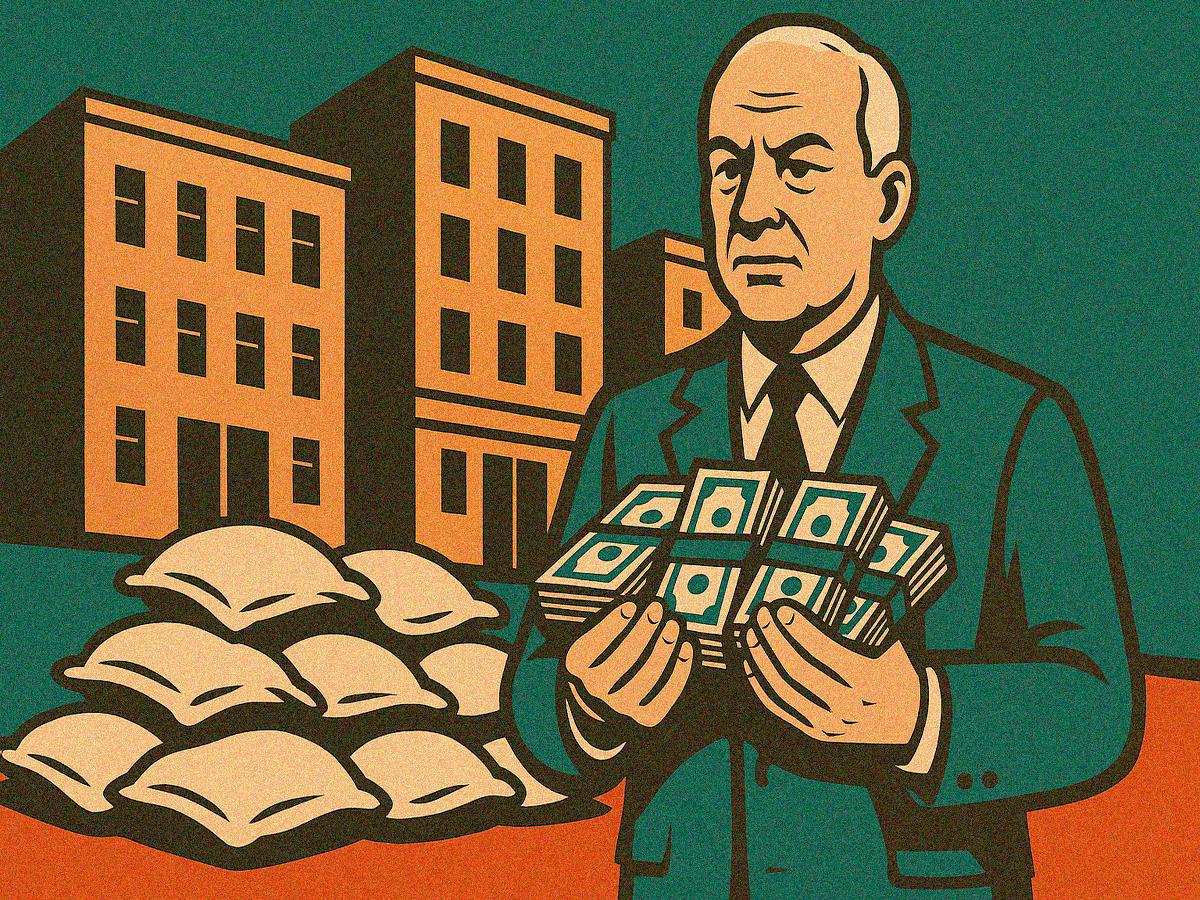This investigation reveals how Belarus's state-owned fertilizer monopoly Grodno Azot has constructed an elaborate scheme to continue exporting to EU markets despite being sanctioned. The company now ships through Latvia after Poland tightened controls, with nearly half of its production still reaching European customers.
The "Special Exporters" Scheme
Belarus created a system of "special exporters" — logistics companies that lease Grodno Azot's production facilities and formally become the "manufacturers" of the fertilizers. This allows them to export to EU countries without triggering sanctions restrictions.
Key findings:
- At least 278 rail cars of Belarusian fertilizers crossed into Latvia in early 2025, reaching Germany, Hungary, and other EU countries
- The scheme generated $8.1 million in profits from EU sales in the first three quarters of 2024 alone
- Despite sanctions, 44% of Grodno Azot's exports (186,000 tons worth $59 million) continued flowing to European markets in 2024
The investigation uncovers deep connections to Lukashenko's inner circle. The scheme relies on EU-registered intermediaries like Estonian company Stacroloft INC. OÜ, whose owner has indirect links to Viktar Sheiman — one of Lukashenko's closest confidants under Western sanctions for nearly 20 years.
Background Context
Grodno Azot was sanctioned following a violent crackdown on workers who joined 2020 protests against Belarus's contested presidential elections.
The evasion scheme that Grodno Azot constructed is based on cooperation with so-called “special exporters” — Belarusian logistics companies who claim to be new producers of nitrogen fertilisers:
“In order to mitigate the impact of EU and US sanctions imposed against Grodno Azot and to return to premium markets of EU countries, an institution of special exporters (economic entities of the Republic of Belarus) was created,” a leaked internal report to the Belarusian Council of Ministers, likely prepared in January 2025, states.
"Special exporters" and "Imitated production": uncovering the method
The “special exporters” sign agreements of leasing Grodno Azot’s productions facilities, making them formally the producer of the fertilisers produced at the sanctioned SOE — documents obtained by BIC show. [*]
“In this case, the leasing company (special exporter) acts as the manufacturer of the fertilizers and can carry out exports to unfriendly countries without being subject to the effect of sanctions,” the same document states.[*]
One such “special exporter” OOO Technospetstrading (Technospetstrading LLC) goes further to claim that rather than using raw materials (Carbamide) produced at Grodno Azot, it imports the chemical from Turkmenistan via Kazakhstan. A Latvian buyer, approached by LSM TV, BIC’s partner in the investigation, presented a Kazakh certificate from Technospetstrading, which allegedly confirms that the carbamide was imported from Turkmenistan.
The investigative journalists, however, question the validity of the documents, as it refers to a different sort of Carbamide — sort “B”, while Technospetstrading exports grade “A” to Latvia. [*][*][*]
Additionally a leaked bank document obtained by BIC from Rabochy Ruch shows Technospetstrading’s statement that 99% of its raw materials comes from Grodno Azot. [*]
Technospetstrading LLC and its sister company TechnospetstradingExport are managed by an Armenian national Armen Harutyunyan, who has a power of attorney from the firms’ nominal owner. [*][*][*][*][*][*][*][*][*]
He is a former business partner of Sergei Teterin, former tennis coach of Alexander Lukashenko, sanctioned in 2021 by the EU for belonging to Lukashenko’s inner circle. [*][*]
At one point, when Harutyunyan was prosecuted in Belarus for running a fraud scheme, Teterin provided him with a loan of $1.7 million specifically to cover the court costs. [*][*][*]
Other Belarus-based “special exporters” also have links to Lukashenko’s sanctioned “wallets”. MetaTradingProm, OOO NFT (NFT LLC), and OOO Logistic Energy LLC (Logistic Energy LLC) are connected to businessman Mikalai Varabei, with employees of his affiliated companies listed as owners of these “special exporters”. [*][*][*][*][*][*][*]
Among the other owners of these three firms are former Grodno Azot executive Aleh Aliokhin, an ex-executive director of The Presidential sports club Andrei Karpovich (seen in photos with Lukashenko’s sons), and Siarhei Puzevich, who is simultaneously an employee of Logistic Energy. The latter company is owned by Neli Maliarova - a longtime employee of Mikalai Varabei - Lukashenko’s “energy wallet”, according to US sanctions designation.
The Belarusian “special exporters” are serviced by intermediaries registered in the EU. An example of such intermediary is Estonian-registered Stacroloft INC. OÜ, which imports fertilizers from ООО MetaTradingProm (MetaTradingProm LLC), a Belarusian “special exporter”. [*]
Hidden connections: business structures linked to Viktar Sheiman
Stacroloft’s owner has indirect links to Viktar Sheiman, one of Lukashenko’s closest confidants. Sheiman has been under Western sanctions for nearly 20 years, suspected of involvement in the assassinations of Belarusian opposition figures.
The connection works as follows — Mikhail Tsyplakov, the father-in-law of Stacroloft’s owner Sergej Nemirovski, was the former deputy director of the state-owned GP Belzarubezhtorg (Belzarubezhtorg SOE) of the Presidential Property Management Department, headed by Viktar Sheiman at the time. At the same time as working for Sheiman in the government service, Mikhail Tsyplakov was one of the former owners of OOO Apstrim (Apstrim LLC), but the company later came under the control of several of Viktаr Sheiman’s trusted associates, including his sister-in-law, Yulia Bryhadnaya.
In addition to Stacroloft (Estonia), Tsyplakov’s son in law Sergej Nemirovski, an Estonian national, owns ERTELA SP. Z O.O. (Poland), which also purchased Belarusian nitrogen fertilisers. [*]
Sergej Nemirovski replied to BIC’s inquiry, refusing to answer the questions as he could not verify the authenticity of the letter. He said the requested information may include trade secrets and third-party data, making disclosure impossible. However, he noted that the company is open to clients and always provides information about its operations. Nemirovsky, Tsyplakov’s son-in-law, added that neither the management nor his relatives are government officials or public figures, and none are on sanctions lists. He also stated that imports from third countries to the EU undergo thorough checks by customs and banks for compliance with sanctions regulations.
MetaTradingProm, just like other Belarus-based “special exporter”, had to switch to the Latvian route after Poland, in late 2024 and early 2025, introduced national sanctions against them in an effort to fight the schemes of evading the EU restrictions. Before that MetaTradingProm supplied to Poland directly using intermediaries, who also have links to Viktar Sheiman. One such intermediary was the Polish company Aliansgroup Sp. Z O.O. [*][*]
Among its founders is a Belarusian national Andrei Lyndou, who is also a co-founder of Belarusian firm OOO Neomit (Neomit LLC). [*][*]
Lyndou’s business partner at Neomit is OOO Mit and Mit company (Belarus), co-owned by Aliaksandr Ramanouski, a former bodyguard of Aleksandr Lukashenko, and an employee of OOO Globalcustom (Globalcustom LLC). The latter company was founded by Sheiman’s partner at the time, who was also possibly the mother of one of his children, and the niece of his previous wife. [*]
Grodno Azot came under sanctions after a violent crackdown against its workers, who joined mass protests against the 2020 Presidential elections, which they deemed fraudulent. Dozens of them were fired on political grounds. More than 50 employees received administrative penalties, and at least 15 were convicted in criminal cases.
Before sanctions, over 70% of Grodno Azot’s exports went to the EU. Yet in 2024, 44% of Grodno Azot’s exports continued to be exported to the European market - a total of 186,000 tons worth $59 million, an internal document obtained by journalists from Rabochy Ruch show. The EU exports enjoyed a 18% profit margin, generating $8.1 million in the first three quarters of 2024. Sales to other foreign markets were lossmaking in 2024, according to the same document. [*][*]
This is a shortened recap of the investigation. Please visit the Belarusian or Russian language page for the full version.
Update 09.07.2025. A response from STACROLOFT INC. OÜ, signed by Sergej Nemirovski, has been added.





